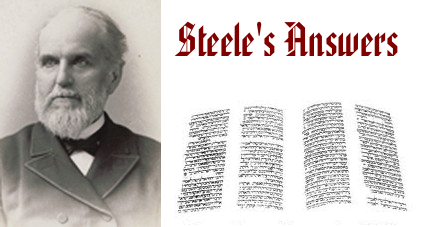It took longer than I thought it would — but, then, the project also got more complicated than I expected.
Daniel Steele was one of the 19th Century holiness writers I read in the earlier stages of my Christian journey, and I scanned many of his books long ago. There were only a few volumes that I had neither read nor scanned. One of these was an old book (published a few years before Dr. Steele's death) called Steele's Answers. I had acquired a copy from AbeBooks, but I found that its contents were not arranged into chapters. The book was composed of short Question and Answer items in no thematic order.
It occurred to me that a blog was the ideal way to present material like this. So, I began this project without having read the book in advance. It was my intention to blog each of the answers in the book in the order in which they appeared. As of last Saturday, that project has been completed.
As I began scanning, editing, and posting the items from Steele's Answers, however, I quickly discovered that the book wasn't very good. That is when I began adding posts from Dr. Steele's other writings, and occasional snippets from various holiness writers of his times.
So, the project became a little more than I had originally foreseen — and quite a bit better for that.
The book Steele's Answers is actually a good reflection of its times — and the beliefs and practices of the holiness-minded Methodists of that day. But, sadly, it is little more than that. The answers are brief and often not especially insightful.
I may return to this blog some day and post some more snippets from Dr. Steele's writings — or from some other of the holiness writers. Or, I may not. We will see.
But, for right now, I am done with this project.
— Craig L. Adams


.png)
.png)
.png)